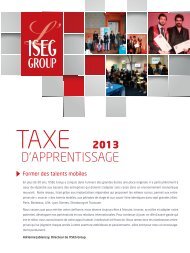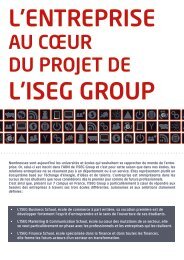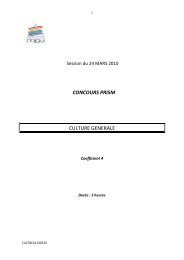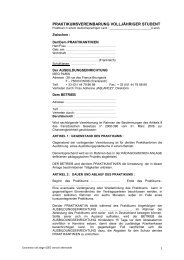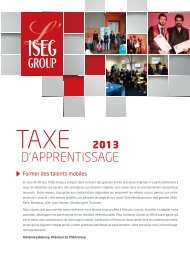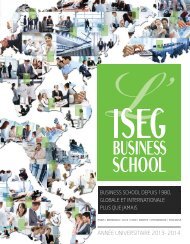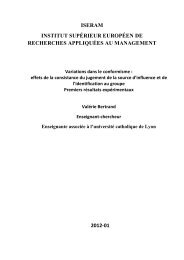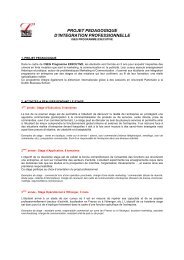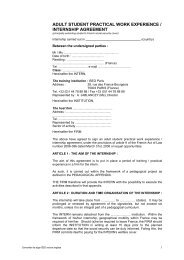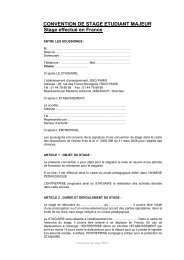concours prism epreuve d'anglais - ISEG Business School
concours prism epreuve d'anglais - ISEG Business School
concours prism epreuve d'anglais - ISEG Business School
You also want an ePaper? Increase the reach of your titles
YUMPU automatically turns print PDFs into web optimized ePapers that Google loves.
18 février 2009CONCOURS PRISMEPREUVE D’ANGLAISCoefficient 2Durée : 1 heure- 1 -Anglais – 18/02/2009
CONCOURS PRISMÉPREUVE D’ANGLAISBARÈMEBarème :Réponse juste = 2 pointsRéponse fausse = - 1 pointPas de réponse = 0 pointPour chaque question, donnez une seule réponse : a ou b ou c ou d- 2 -Anglais – 18/02/2009
Part 1: VocabularyCochez la bonne réponse sur la grille de réponses.1) I didn’t write it. That is not my ………….. on the cheque.a) markb) letterc) firmd) signature2) Those people over there are speaking a language I don’t understand. They must be…………… .a) foreignb) strangec) rared) abroad3) We have …………….. for a new secretary but we haven’t had any replies yet.a) advisedb) announcedc) advertisedd) noticed4) I’ve ……………….. for the job and I hope I get it.a) appointedb) appliedc) presentedd) succeeded5) This lift is out of ……………. so we’ll have to walk.a) functionb) orderc) runningd) work6) I …………. an answer to my letter within a few days.a) hopeb) expectc) waitd) look forward7) They have put the bird in a cage to …………. it from flying away.a) avoidb) preventc) hinderd) resist- 3 -Anglais – 18/02/2009
8) Sixty per cent of television viewers chose him as their ……………. actor.a) popularb) preferredc) favourited) favoured9) We’ve been ……………. with that firm for many years.a) treatingb) making businessc) dealingd) supplying10) You’d better add it up. I’m no good at …………….. .a) countersb) charactersc) summariesd) figures11) Our main concern is to raise our customers’ ……………… of satisfaction.a) standardb) levelc) capacityd) conditions12) I …………… him some money and must pay him back tomorrow.a) lentb) borrowc) owed) own13) He was ………….. from the firm because he was always late for work.a) sackedb) retiredc) resignedd) disposed14) She got married although her parents had not given her their ……………. .a) allowanceb) consentc) permitd) let15) I couldn’t …………… the meeting because I was so busy.a) participateb) assistc) attendd) present- 4 -Anglais – 18/02/2009
Part 2: GrammarCochez la bonne réponse sur la grille de réponses.1) I work at Barclays Bank. ………… there since 1967.a) I’m workingb) I’ve been workingc) I am workerd) I have been worker2) ………… of them knew about the plan because it was secret.a) Someb) Anyc) No oned) None3) Jane had ………….. furniture for her room.a) enoughb) manyc) alld) any4) She ………….. the cinema, but her husband doesn’t go with her.a) used to gob) usually seesc) often goes tod) visits sometimes5) I like ………….. two records.a) all theseb) both thesec) these alld) these both6) ………….. people came than I expected.a) Otherb) Fewerc) Anotherd) Few7) Many parents allow their children …………… own decisions.a) making theirb) making thec) to make theird) to make the- 5 -Anglais – 18/02/2009
8) Teresa wasn’t the only one in the car. ………….. .a) It was some other.b) There was some other.c) It was someone else.d) There was someone else.9) Don’t make him ……………. it if he doesn’t want to.a) dob) to doc) doingd) to doing10) I’ve been looking for you …………. .a) anywhereb) in all placesc) nowhered) everywhere11) Claire is …………. Susan.a) a lot pretty thanb) much more pretty thatc) a lot prettier thatd) much prettier than12) Peter came into my office while I …………… the arrangements for my flight toParis.a) madeb) have being makingc) had maded) was making13) She is already about …………… her mother.a) so tall thanb) as tall thanc) as tall asd) so tall as14) He hasn’t been here …………… .a) three weeks agob) since three weeksc) for three weeksd) during three weeks15) “You ………….. more careful,” he said.a) would beb) ought bec) should bed) had to be- 6 -Anglais – 18/02/2009
Part 3: Reading comprehensionConversation passage for comprehension:“London’s commercial and financial development”Jane Thompson: Susan, I really enjoyed your conference about modern London, and mystudents did too. The part about the City was especially enlightening.Susan Peabody: Thank you very much, Jane.J.T: While we are having lunch, could you tell me more about the beginnings of the City?S.P: Well, Jane, the City is the oldest part of London. For commercial reasons, it wasestablished on the Thames, where ships could enter thanks to the North Sea tides. It has beena booming trade centre for sea-trade merchants since Roman times.J.T: Is it true that the joint-stock company is an English invention?S.P: Indeed. In the 16 th century, because trade merchants needed money, they proposed thatLondoners or others should invest their trades and thus become part owners and profitsharers.You must have heard of the famous East India or Virginia companies.J.T: Of course. And what about the origin of the Stock Exchange ?S.P: It goes back to the 17 th century. People used to gather in coffee houses to discuss andexchange shares. These places are the origin of the Stock Exchange.J.T: And what about the insurance business the City is so famous for?S.P: Again, because of the development of sea trade, merchants needed protection so theyused to meet at certain coffee houses to get insurance contracts.J.T: Very logical. And the Bank of England?S.P: London, in the late 17 th century, was in continuous financial and political crises. Foryears, the monarchy had had excessive demands for money. There were constant strugglesbetween the Whigs and the Tories. But King William III restored order and the creation ofthe Bank of England in 1694 opened a new era of government financing. The need to takecare of public debt explains one of the Stock Exchange’s most important activities today: thetrading in government bonds which we call gilts or gilt-edged securities.J.T: Yes, we call those Treasury bonds or Treasury bills. Why are they called gilts?S.P: Because, at the beginning, they were printed on paper which was gilt-edged, and alsobecause investing in government debt is supposedly as safe as investing in gold.J. T: What happened in the following centuries?S. P: Well, the Stock Exchange was very active in the industrial revolution by investing insuch infrastructures as railways and canals. It also helped in the making of the British Empireby investing in mining in Canada, South Africa and elsewhere. The stability of the poundhelped. In fact, London, with its City, was the leading financial centre. Then after WorldWar I, Wall Street took over. By the way, Jane, where does the name of New York’s StockExchange come from?J. T: You know New York was settled by Dutch colonists. They had erected a wall acrosslower Manhattan island to protect themselves against enemies. Wall Street, going fromBroadway to the East River, follows the line of this old wall and this explains its name. Butto go back to the London Stock Exchange, I would like to know more about its situationbefore the famous Big Bang.S. P: Until the 1980s, the City was very special indeed with the Bank of England and otherbanks, its insurance companies, its Stock Exchange and its commodity exchanges. There wasa male-dominated clubbish atmosphere. Women were not allowed on the floor of the StockExchange before 1973. These people were gentlemen whose words were sufficient to make adeal. Also specific to those days were jobbers and brokers. The former were wholesalers of- 7 -Anglais – 18/02/2009
shares specialised in certain securities whereas the latter acted as intermediaries between theirclients and the jobbers. The two professions were completely separate.J. T: I know about those practices. They couldn’t have lasted long faced with the competitionfrom New York and Tokyo.S. P: You are perfectly right. That’s why the London Stock Exchange had to become moremodern. The jobbers and brokers were replaced by a single category: the broker dealers whocan work for clients as well as for themselves.J.T: And it was the Big Bang.S.P: Yes. A true revolution for the City. On 27 October 1986, many changes happened.Brokerage commission was no longer fixed, the Stock Exchange was opened to British andforeign companies and no longer exclusively to British individuals, and trading operationswere computerised.J. T: The famous Stock Exchange Automated Quotations system which has replaced thetraditional trading floor. Now everything appears on screens, the trading rooms aredecentralised and part of a network. You took the idea of your SEAQ from our NASDAQ.S.P: We had to abandon our Victorian habits and start something new. A sort of rebirth.J.T: Susan, thanks to your clear explanations I must say I now have a better understanding ofthe financial development of your beautiful capital. I hope I didn’t prevent you from enjoyingyour meal.S.P: Not at all, Jane. I love London and I am always pleased to help in making it moreunderstandable to my American colleagues. When you come to Oxford next September foryour conference on New York, it’ll be my turn to ask you questions.J.T: And it’ll be my pleasure to answer them. Anyway, for the time being, we have to rush ifyou don’t want to miss your plane. No more questions; let’s have a good coffee.- 8 -Anglais – 18/02/2009
Cochez la bonne réponse sur la grille de réponses.1) The City started developing its sea-trade:a) in the Middle Agesb) in Roman timesc) in the 17 th centuryd) in the 18 th century2) The London Stock Exchange appeared:a) in the 16 th centuryb) in the 17 th centuryc) before the creation of the Cityd) in 16943) London remained the leading financial centre until after:a) 1875b) World War Ic) World War IId) New York was settled by Dutch colonists4) Women were allowed to trade stocksa) in 1963b) in 1973c) at the same time as mend) only if men decided so5) The distinction between jobbers and brokersa) was an American inventionb) was a true revolution of the Cityc) meant that a broker was a wholesaler of specialised sharesd) disappeared in 19866) The Big Bang wasa) a financial crisis similar to that of 1929b) a boom in the London Stock Exchangec) a modernisation of the London Stock Exchange trading habitsd) a crisis caused by the distinction between jobbers and brokers7) NASDAQ ………….. the London Stock Exchange.a) drew inspiration fromb) replacedc) became at some point a source of inspiration ford) is the Japanese equivalent of- 9 -Anglais – 18/02/2009
8) Next September, a conference is to be helda) in New Yorkb) in Londonc) in Oxfordd) by Susan Peabody9) Treasury bondsa) are investments in goldb) are non government bondsc) used to be the Stock Exchange’s most important activityd) are also known as gilt-edged securities10) Susan Peabody and Jane Thompson area) both Americanb) work in the same institutionc) both academicsd) both British11) The conferencea) was about the Cityb) took place in Londonc) was held in the USAd) took place in Susan’s beautiful capital12) Jane ………. the origin of the Stock Exchangea) knew all aboutb) was surprised to hearc) was asked aboutd) explained13) In the last years of the 17 th Centurya) England was not yet a monarchyb) public debt in England was inexistentc) the Bank of England was excessively in debtd) England was politically and financially in bad shape14) The Stock Exchange Automated Quotas systema) was replaced by the traditional trading floorb) introduced new habitsc) needs to be replaced to bring about something newd) was introduced just before the Big Bang15) The conversation between the two women is taking placea) on the way to the airportb) in a restaurantc) on a planed) in the morning- 10 -Anglais – 18/02/2009
CONCOURS PRISMSession du 18 Février 2009ÉPREUVE D’ANGLAISN° Candidat : __ -__ __ - __ -__ __ __ __ __ __ __GRILLE DE RÉPONSESFeuille à détacher et à nous remettre à la fin de l’épreuvePart 1: VocabularyABCD1 2 3 4 5 6 7 8 9 10 11 12 13 14 15Part 2: GrammarABCD1 2 3 4 5 6 7 8 9 10 11 12 13 14 15Part 3: Reading comprehensionABCD1 2 3 4 5 6 7 8 9 10 11 12 13 14 15- 11 -Anglais – 18/02/2009
CONCOURS PRISMSession du 18 Février 2009ÉPREUVE D’ANGLAISGRILLE DE RÉPONSESPart 1: VocabularyABCD1 2 3 4 5 6 7 8 9 10 11 12 13 14 15Part 2: GrammarABCD1 2 3 4 5 6 7 8 9 10 11 12 13 14 15Part 3: Reading comprehensionABCD1 2 3 4 5 6 7 8 9 10 11 12 13 14 15- 12 -Anglais – 18/02/2009



